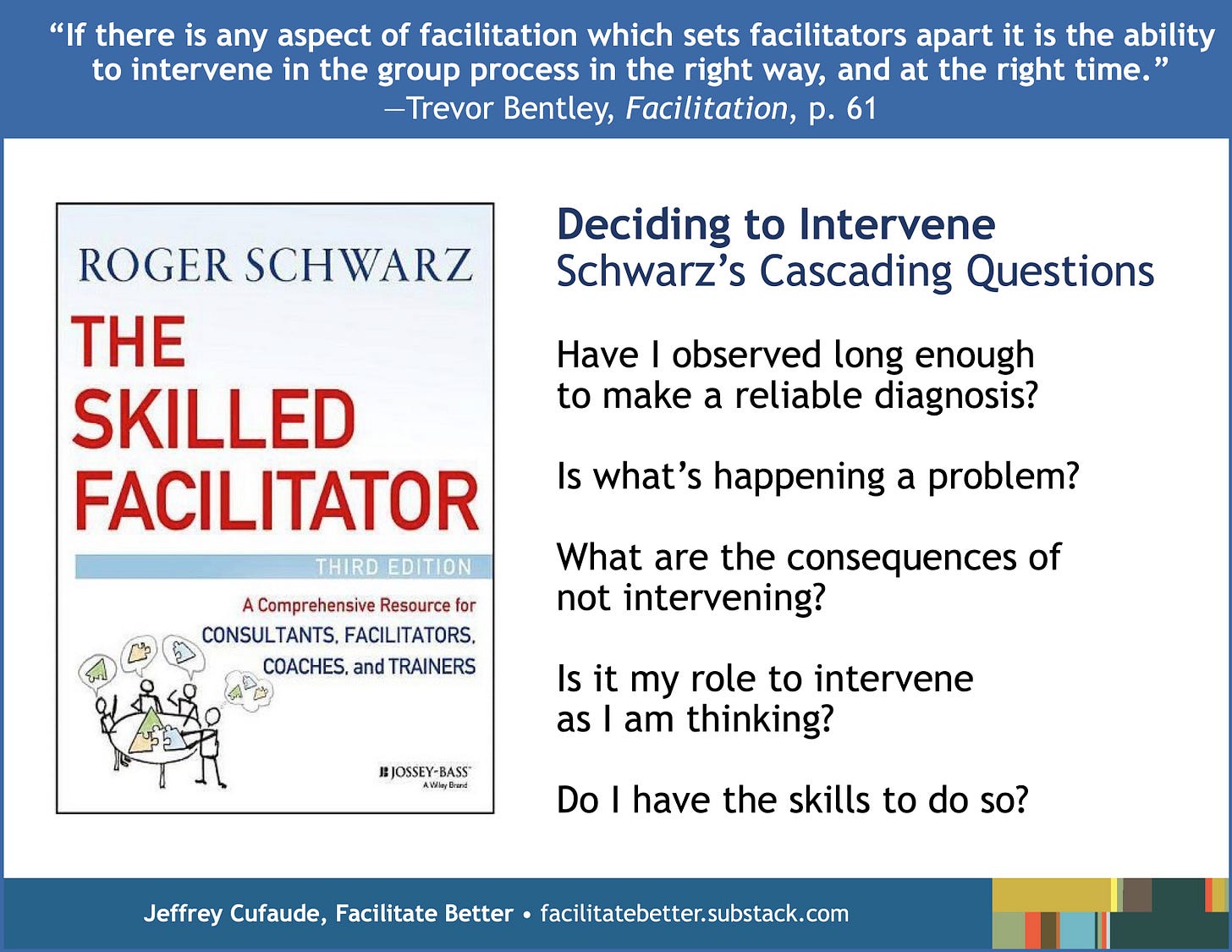Should I Do Something? (Facilitation Friday #13)
Deciding when and how to intervene is one of the most critical questions for facilitators to answer.
People flipping through the conference program guide or checking their phones during a workshop. Crossed arms or a sea of silence during a staff meeting. A few individuals always seem to gather during breaks in a strategic planning session.
During any facilitation effort, you experience all kinds of individual and group behavior, sometimes feeling the need to do something about what is happening. The critical question is simple: should you?
In his excellent primer, The Skilled Facilitator, Roger Schwarz provides some critical questions to help determine whether or not we should intervene. I offer several below (verbatim, bold) coupled with my own commentary.
Have I observed long enough to make a reliable diagnosis?
Patience really is a virtue when it comes to effective facilitation. While you will notice many things, you must spend enough time with them to consider their possible meanings.
Remember the distinction between observations (the facts of what is happening) and inferences (your interpretation or judgment about your observations). The ladder of inference illustrates how we move between the two.
You bring your own “lenses” and mental models into any facilitation effort, filtering what you see through all of your life experiences and cultural layers of identity. Take time to thoughtfully consider the various interpretations of what you observe before assuming you definitely know what it means.
And you can always check others’ sense of what is happening by simply sharing your observation without offering any inferences: “I'm noticing a lot of side conversations happening right now.” The group will tell you what it means.
Is what’s happening a problem?
This has to be one of the most critical, but overlooked self-assessment questions. Just because you notice something and understand what it likely means, doesn't suggest you have to do anything about it.
Is the one person reading a magazine during your workshop a problem? For whom? How do you know this?
The goal isn't to intervene anytime an opportunity exists to do so; the intent is to do so only when necessary. Remember, effective facilitation provides group process leadership with restraint.
And be sure to consider organizational culture and group norms when determining whether or not something is a problem. Behaviors that for some people would indeed be concerning are often commonly accepted in other settings.
What are the consequences of not intervening?
Effective facilitation helps group participants manage themselves, not do the work that rightfully they should own. I suggest the default setting on your intervention software is best left at “do nothing” so that you only activate your involvement after considering the implications of doing so,
Or to think of it another way, consider your interventions like lifelines in Who Wants to be a Millionaire. The group has a limited number of opportunities to access them. Does this situation really require them using one of them up? Or can you wait and see how participants themselves might address the dynamic that has caught your attention or if the group continues to progress despite of it?
Is it my role to intervene as I am thinking?
You notice something happening. You observe it long enough that you're sure of its meaning. It presents some challenges for the group, and you deem not intervening as undesirable. You're poised to do something, but is what needs to be done part of your role?
Many considerations may be involved in answering this question: organizational hierarchy and culture, previous actions of others’ comparable facilitation, any shared norms and expectations the group developed, and participants’ beliefs about your role and contributions, among others.
To avoid potential difficulties mid-facilitation, help surface participant expectations and clarify your role at the onset when different understandings are best addressed and negotiated.
Sometimes you might feel the need to intervene even when it is not a part of how your role is defined. In those instances, you can ask for permission to do so, acceding to the will of the group:
“My role today is primarily to help manage the conversation, not be a participant in its content. But given what is happening right now, I feel I could make a useful contribution to help you achieve your objectives for this meeting. If you would like me to do so, I will step out of my facilitator role momentarily to share those thoughts and then resume managing the discussions.”
Do I have the skills to do so?
Don't forget this one. Just because you answered yes to the previous four questions doesn't mean you're always prepared to do what needs to be done.
When unsure if I am, I find it helpful to simply share that with the group, explaining what I have noticed, what I think it means, and why I think we need to do something about it:
“We have an increased number of side conversations occurring and people reacting negatively to what's being discussed. I sense tension and frustration rising as well. I want to help us refocus and reconnect as a group, but I'm struggling with how I can best help you do so.”
Concerned that sharing you're not sure what to do or how to help will make you vulnerable in front of a group? I'd like to suggest the opposite. It's a statement of strength because it is honest, open, and authentic. What could be more vulnerable or risky is choosing to intervene when you lack the skills to do so.
Bottom line?
As Trevor Bentley, so aptly notes in Facilitation: “If there is any aspect of facilitation which sets facilitators apart it is the ability to intervene in the group process in the right way, and at the right time.” Schwarz's questions can help us do so.
Getting in Action
Think of meetings or workshops you’ve facilitated. What have you noticed among participants that made you think you should intervene as a facilitator? What can you learn from what seems to attract your attention?
What are some situations or participant behaviors that are open to a variety of interpretations, ones that you especially do not want to assume you know what they mean?
In what situations might you feel the need to intervene, but are unsure of your ability to do so effectively? Whose counsel (or what resources) could help you develop your competence and confidence to manage those moments?
© Facilitate Better and Jeffrey Cufaude. All rights reserved.
To affordably license this content for reprint on your site or in electronic or print communications or to contact me regarding customized facilitation skills workshops or consultations, complete this form.





